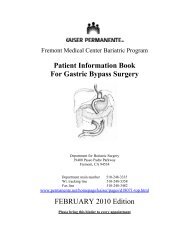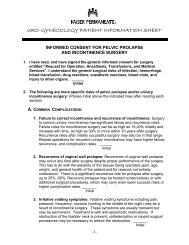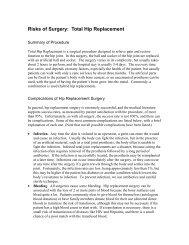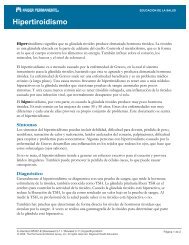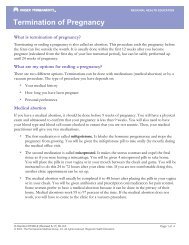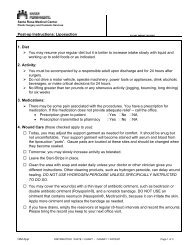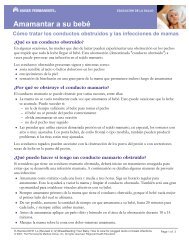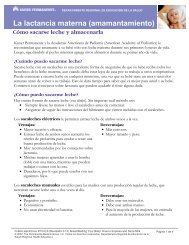informed consent for pelvic prolapse and ... - permanente.net
informed consent for pelvic prolapse and ... - permanente.net
informed consent for pelvic prolapse and ... - permanente.net
You also want an ePaper? Increase the reach of your titles
YUMPU automatically turns print PDFs into web optimized ePapers that Google loves.
B. LESS COMMON COMPLICATIONS:<br />
1. Injury to the bladder or ureter: This may occur during hysterectomy or<br />
repair of anterior vaginal wall <strong>prolapse</strong> (cystocele), or bladder neck repairs <strong>for</strong><br />
urinary incontinence. Injury to the bladder may require prolonged urinary<br />
catheterization <strong>and</strong> may result in bleeding, infection, or, infrequently, fistula<br />
into the vagina (urine comes out through a hole into the vagina) , <strong>and</strong> painful<br />
or frequent voiding. Injuries to the bladder usually heal well but may result in<br />
the need <strong>for</strong> more extensive surgery or permanent symptoms. Injury to the<br />
ureter may result in prolonged catheterization or major surgery to correct the<br />
injury, including permanent damage to the ureter or kidney. ______<br />
Initial<br />
2. Bladder neck obstruction: Obstruction to the flow of urine is a known<br />
complication of surgery to correct urinary incontinence. Obstruction may be<br />
temporary, or permanent, requiring additional surgical procedures to relieve<br />
the obstruction. Initially, obstruction is usually treated with urinary catheters,<br />
either indwelling, or the patient is taught to catheterize herself several times a<br />
day until the obstruction is relieved. “Sling” procedures carry a higher risk of<br />
obstruction than traditional bladder neck elevation procedures, as high as<br />
25% in some reports. Catheters may be required <strong>for</strong> weeks after surgery until<br />
voiding becomes normal, or a decision is made to re-operate to relieve the<br />
obstruction. Operations to relieve bladder neck obstruction may not be<br />
entirely successful or multiple surgeries may be necessary. Permanent<br />
symptoms of obstruction including pain, pressure, urgency, <strong>and</strong> frequency<br />
may result. ______<br />
Initial<br />
3. Stricture of the vagina: Stricture, or narrowing, of the vagina may occur as a<br />
result of surgery to repair vaginal wall <strong>prolapse</strong>. This stricture may cause<br />
pain <strong>and</strong> difficulty with sexual intercourse. Stricture may be treated by vaginal<br />
dilatation or may require additional surgical procedures, including possible<br />
skin grafting. Stricture may be difficult to correct surgically <strong>and</strong> may result in<br />
permanent symptoms. ______<br />
Initial<br />
4. Fistula: A fistula, or hole from the ureter, bladder, or rectum, into the vagina<br />
may result from surgery on these organs. Fistulae may necessitate major<br />
surgery to correct the injury <strong>and</strong> may result in permanent catheterization <strong>for</strong><br />
the kidney, temporary or permanent colostomy, or permanent damage to the<br />
ureter, bladder, or rectum. ______<br />
Initial<br />
5. Injury to the bowel/rectum: This may occur during hysterectomy or repair of<br />
posterior vaginal wall <strong>prolapse</strong> (rectocele). A fistula (hole) may result in stool<br />
coming out into the vagina, requiring a temporary colostomy (surgery to divert<br />
the stool into a bag). Incontinence (leakage) of stool or gas may be a<br />
permanent result of rectal sphincter injury. More extensive surgery or<br />
resection (cutting out) of a portion of the bowel may be necessary <strong>for</strong><br />
significant injury to a portion of the bowel. ______<br />
Initial<br />
-2-





